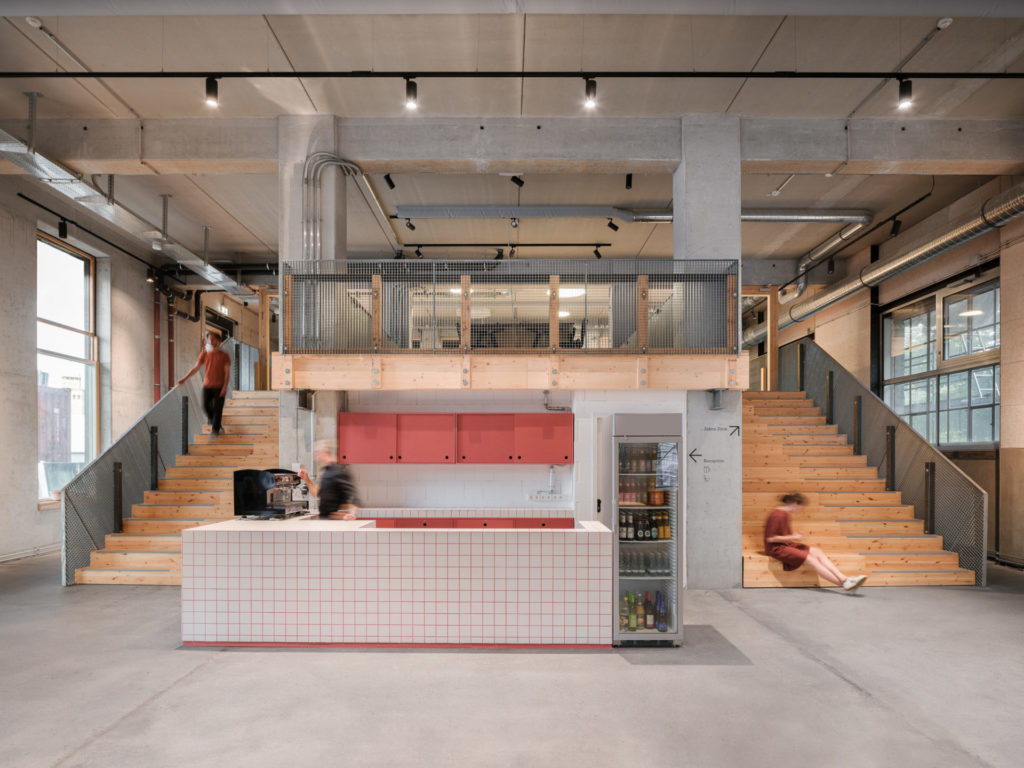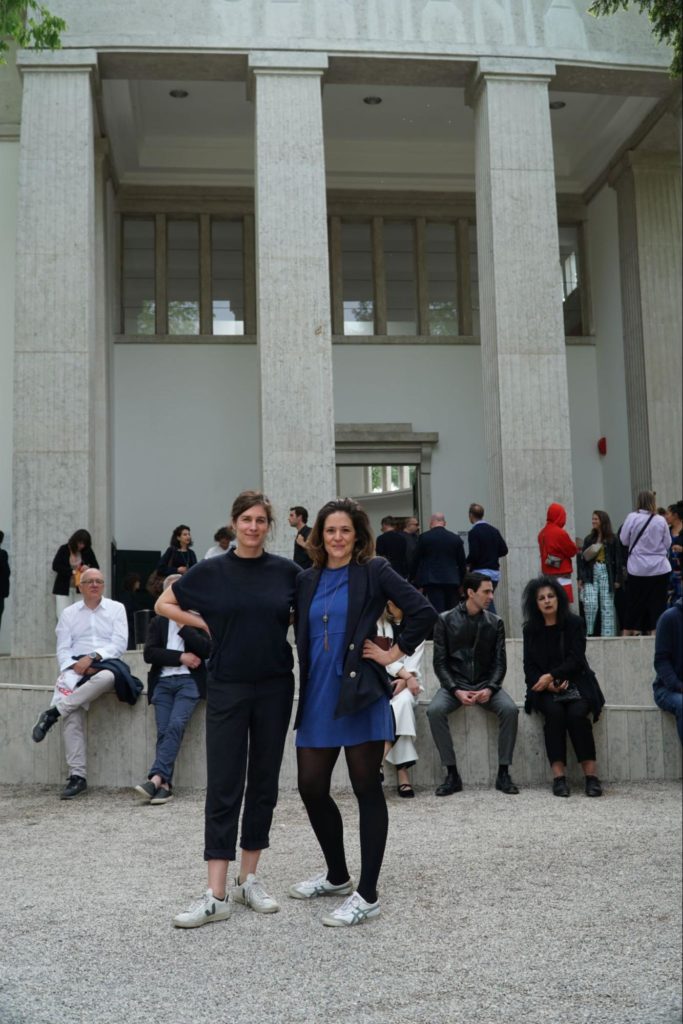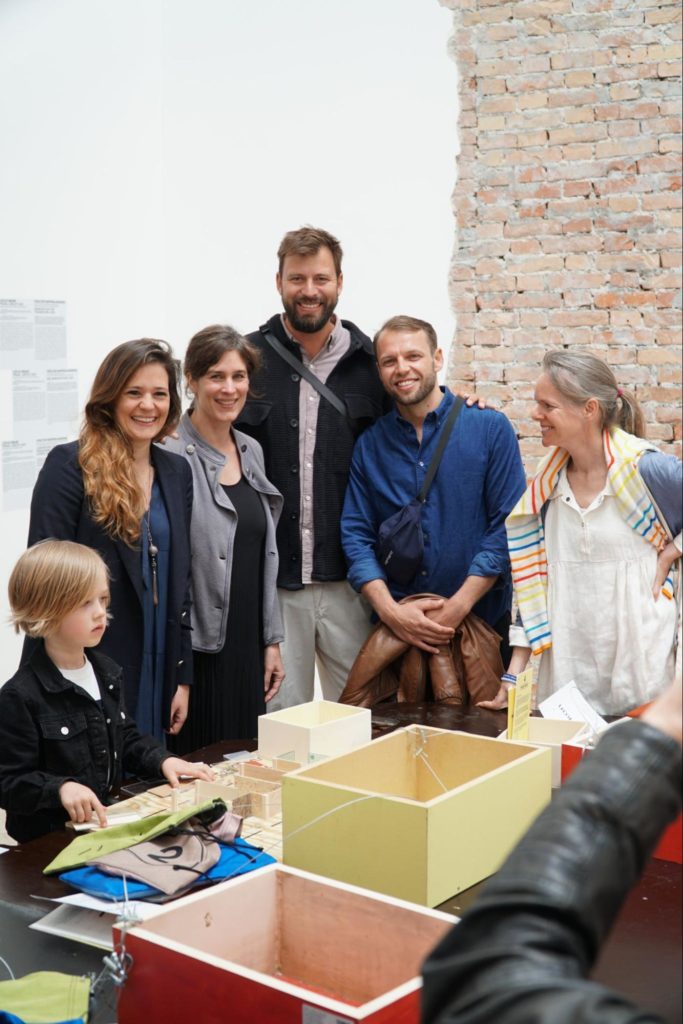Impact Hub Berlin at the Biennale 2023
May 2023 excitedly marked the start of the esteemed 18th International Architecture Exhibition — La Biennale di Venezia in Italy. In this year’s German Pavilion, entitled “Open for Maintenance,” Impact Hub Berlin was honoured to represent an important aspect of contemporary architecture – circularity. Undoubtedly, the unique use, design, and culture of Impact Hub Berlin in the CRCLR House is a prime example of sustainable, circular architecture based on varied open-ended, collaborative processes. With its structure and emphasis on material reuse, the CRCLR House embodies the power of convergence with sustainability and creativity in architecture and space design.
The story of the Circular House found its way to Venice as it perfectly plays out the transformative potential of a new building framework focused on reuse which is central to the unique concept of “Open for Maintenance” curated by ARCH+, Summacumfemmer Büro Juliane Greb. It is playing that we brought to the pavilion, with a one of a kind educational board game for the visitors to try. In fact, the whole International Exhibition under the Theme “Laboratory of the Future” is like a playground of ideas, new narratives, and solutions for a more sustainable, diverse, and resilient future, and we couldn’t be more excited to play our part in it.
With its circular design Impact Hub Berlin entered a new cultural area, but the theme of transformation remains a constant in all our fields of impact. Impact Hub Berlin at CRCLR House was created in collaboration with TRNSFRM eG and LXSY Architekten between 2020-2022. It was an open and hands-on process, with different teams spotting opportunities and securing the best reusable materials from other sites and buildings, including hotels, museums, and nightclubs. Ongoing prototyping workshops allowed for ‘old’ materials to be tested for their new use in the space. Social compatibility, accessibility, diversity, environmental friendliness, resource conservation, and waste avoidance all played an essential role in guiding the planning and construction.
These qualities of Impact Hub Berlin’s circular home could not be more in line with the central themes of the German pavilion “Open for Maintenance” and opened the way for our impact community and coworking space to contribute to the world’s leading architecture show. Open for Maintenance is a telling title. This year’s German contribution to the exhibition deals with “questions of social and spatial inclusion,” utilizing and re-using over 40 pavilion materials from the 2022 Biennale to showcase a new building culture. The Pavilion uses transformation and sustainability to shed light on our current social, political, and economic challenges. The showcase was realized entirely with leftover material from last year’s Biennale and opens discussions on care, repair, and maintenance. “Open for Maintenance” is a creative and artistic response to the resource problem presented by Biennales, which leaves behind hundreds of tons of materials and trash every year.
Back home in Berlin, the CRCLR House stands for the future of upcycling and using materials as they are found. Overall, it shows what happens when form follows availability, turning the idea of planning on its head and asking everyone involved to be flexible and trusting. The idea is that buildings should be determined by the materials and resources that are readily accessible rather than forcing the use of specific planned elements. It’s a form of architecture rooted in the context and resources of a particular place, acknowledging and utilizing what is naturally abundant or accessible. By embracing this concept, architects can create structures that respond to local conditions and contribute to a sustainable and resilient building environment, just as it is our ongoing goal for Impact Hub Berlin.
Despite the use of a diverse material mix, there is still a strong focus on a clear-cut, homogeneous, and high-quality design that caught the Polis Award’s attention. Impact Hub Berlin at CRCLR House won this year’s 3rd place prize in the section Ecological Reality, which honours projects that contribute to the public well-being of a city beyond its own scope. We are humbled by the recognition that our space concept continues to gain in the press. With its collaborative use and various community focused events, we aim to offer an active meeting place that strengthens social cohesion and supports inclusion and integration.

As collaboration is in our DNA, we co-created our piece for Venice with our Architects and contributed an interactive educational board game called “Trivial Circuit”, inviting everyone who passes by to play along. Visitors to the pavilion can come together at a table and play. The game focuses on the topic of circular construction, inspired by the experiences forged during the development of the Circular House.
Impact Hub Berlin’s Co-Founder, Leon, and our Head of Space Experience, Sascha, represented us at the pavilion opening and had the chance to replay the fruitful and exciting collaboration with our architects on the board. Leon and Sascha were deeply inspired and moved when witnessing the environment and how seamlessly Impact Hub Berlin’s contribution fit in. Their three-day visit to the Biennale proved to be a reassuring one when observing visitors continuing to engage with the game and understanding the German Pavilion and CRCLR House, and valuing the approach. The overall positive feedback confirmed that the game and German Pavilion are doing pioneer work in promoting sustainability and circularity. They noticed that also pavilions at the Biennale are taking a similar direction of circularity; this shows through new perspectives, change is possible with an overall push to reduce wastefulness.
Within the Biennale, the Open for Maintenance pavilion is not an exhibition. It is an action framework and set of collaborations for a building culture beyond the prevailing model. The Pavilion does not exhibit the many participating initiates and groups; it actively involves them in the programme and the practical work. Some aspects of the Pavilion include the Bathroom representing the sanitary revolution and the Kitchenette intended to become a communicative switchboard. There is a multitude of communication material to reflect and promote work surrounding social struggles, inviting others to come for discussion as a meeting space. Many other program participants and partners share the same values, for example, the Goethe-institute, which will act as the German Pavilion programming partner addressing the further aspects of the curatorial concept through its program series “Performing Architecture.”
“The jury was surprised by the originality of the concept emphasizing repair and a workshop character which also involves collecting physical leftovers from the Biennale Arte 2022. In the midst of such improvised, unpredictable surroundings, exemplary projects will be shown, and initiatives will be offered a platform. The jury expects these strategies to make innovative use of the German pavilion while offering a transformative approach to the Biennale as a whole, especially by incorporating and networking specific groups within Venetian civil society” - Personal statement from Peter Cachola Schmal, director of the German Architecture Museum, chairman of the selection jury for the German Pavilion.
Our contribution to the German pavilion links the worlds of art & architecture and the impact scene. One central theme of this year's Biennale is, "Only a social turn in architecture will lead us to sustainable practices.” It resounds our claim that we can only create a better future to live in through better business.
The invitation to participate in the Biennale proves that Impact Hub Berlin’s focus and our approach to building and space design focused on re-use, repair, and preservation are top of mind in architecture and other socio-economic ecosystems.
It’s fantastic to witness the efforts and growing trends of collaboration and partnerships when addressing the urgent social, ecological, and economic challenges of our times. As we navigate the complexities of a global climate, the need for working together across disciplines is undeniable. Collective efforts from diverse perspectives are becoming a new practice, leading to a shift towards collective action over individual success.
At Impact Hub Berlin, we remain dedicated to our ecosystem approach and advancing the transition to a circular economy on many levels, including architecture and space management. After sharing a piece of our incredible circular home with the world, we even more appreciate and enjoy working here and bringing it to life daily. If you're curious, you can book tours of Impact Hub Berlin or, even better, become a member of our community. Of course, if you’re in Venice this summer or fall, stop by the German Pavilion to play a round of “Trivial Circuit.”

Marketing & Communications Intern






